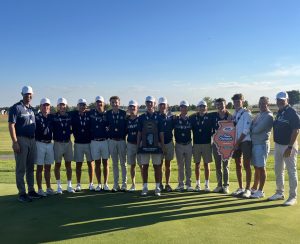[Wrinkly Face]book
October 16, 2015
A day doesn’t go by where my mom doesn’t reference Facebook.
“I used to have the biggest crush on Jimmy Gardner. He and I took Spanish together junior year.”
“Priscilla Perotti and Ab Igram were the prom king and queen and now they’re married and have three kids.”
“I can’t believe some of these other women are my age.”
Her entire high school experience culminated in Mark Zuckerberg creating a space for the class of ‘84 to reconnect and share images with one another.
Although I can’t imagine this being Zuckerberg’s original intention, I feel like Facebook has evolved into a Mom Mecca. Zuckerberg created the website in his Harvard dorm room; first, it was only available to him and his peers. Eventually, the network grew to include surrounding Boston universities and the Ivy League, and by 2006, everyone over the age of 13 with a valid email address had an account.
Facebook’s main purpose is to connect people who have likeminded interests and mutual friends, but over the past several years, many factors have obstructed that focus.
I fell out of touch with Facebook for many reasons. For one, it became increasingly repetitive. Let’s say I’m friends with person A, B, C, and D on Facebook. Person D has a party and invites their best friends, person A, B, and C. In the days following said party, person A, B, C, and D all proceed to post the same pictures from the same party. After years of this monotony, it got the best of me, and so, my Facebook hiatus began.
Facebook isn’t nearly as filtered as platforms like Instagram. People will post multiple pictures at a time, all highlighting the fact that they went to Cabo for spring break and took a picture in front of an architectural-looking rock. Quite frankly, I would rather see one phony, FaceTuned selfie on Instagram rather than 10 outtakes on Facebook.
Another reason I felt like the URL had no place in my bookmarks was because I was becoming way too interested in other people’s lives. The truth was, they were no different than mine. I go on family vacations too and I’ve never felt the need to validate that by posting 10 photos in front of a rock.
Our parents’ generation approaches Facebook much differently than teens. They’re busy showing off their aspiring children instead. Feeds are filled with soccer games, amateur theatre performances, and Science Olympiad wins rather than blurred out red solo cups and aluminum cans (you’re not fooling anyone).
As current high-schoolers, we’re connected with one another every second of our lives through mediums like Snapchat, Twitter, and Instagram. Our elders, on the other hand, are not. The people they’re “confirming” and “denying” have their own lives separate from the confines of the North Shore. The people my mom is interested in staying connected with are actually adding to her life by sharing “what’s happening” in Denver, for example, not Wilmette.
Facebook’s demographics are clearly changing. Business Insider came out with a report detailing that, in 2012, 42% of teens listed Facebook as the “most important” social network. Only 14% agreed with that comment in 2015.
When you live in such close proximity to your Facebook friends, the feed becomes irrelevant. The websites main purpose is to connect people near and far, but mostly far.











































